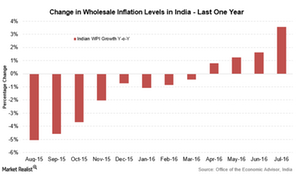RBA Minutes Exhibit Dovish Bias, Wholesale Prices Rise in India
The RBA released its minutes. Inflationary pressures were subdued—noted by a sluggish rise in consumer prices in Australia of 1% in 2Q16.
Aug. 17 2016, Published 8:12 a.m. ET

RBA confirms slow rise in inflation, expected to keep rates low
The RBA (Reserve Bank of Australia) released its minutes. It acknowledged that inflationary pressures were subdued—noted by a sluggish rise in consumer prices in Australia of 1% in 2Q16—the weakest level in 17 years. The RBA said that there was more scope for a growth in the economy if rates were kept lower. The overall inflation outlook by the central bank remained largely unchanged, while an eased stance is expected to continue with respect to the country’s monetary policy. The RBA cut interest rates by 25 basis points earlier this month to bring the benchmark rate to a record low of 1.5%. To learn more, read Australian Dollar Rose despite the RBA’s Monetary Easing Measures.
The iShares MSCI Australia (EWA) rose by 0.07%, while the Vanguard FTSE Pacific (VPL) fell by 0.66% on August 16 at 3:30 PM EST.
Wholesale prices in India rise for the fourth straight month
Wholesale prices in India rose by 3.6% in July on an annual basis—compared to a rise of 1.6% in the previous month and above forecasts of 2.6% growth. It was the fourth consecutive month recording a growth in prices. It’s the highest recorded WPI (wholesale price inflation) in India since August 2014—primarily driven by higher prices of food and manufactured products. It was partially offset by a decline in energy prices. On a monthly basis, India’s WPI rose by 1.0% in July—compared to a rise of 1.4% in the previous month. The iShares MSCI India (INDA) and the WisdomTree India Earnings (EPI) fell by 0.95% on August 16 at 3:30 PM EST.
Israel’s GDP rose by 0.9%
Israel’s economy rose by 3.7% on an annual basis in 2Q16—compared to a rise of 2.2% in the previous quarter. Its GDP growth was primarily driven by an increase in private consumption, government spending, and fixed asset investments.
External trade also increased as exports and imports rose in the second quarter. Israel’s economy rose by 0.9% on a quarterly basis in 2Q16—compared to an increase of 0.5% in the previous quarter. The iShares MSCI All Country Asia ex Japan (AAXJ) fell by 0.52% on August 16 at 3:30 PM EST.
